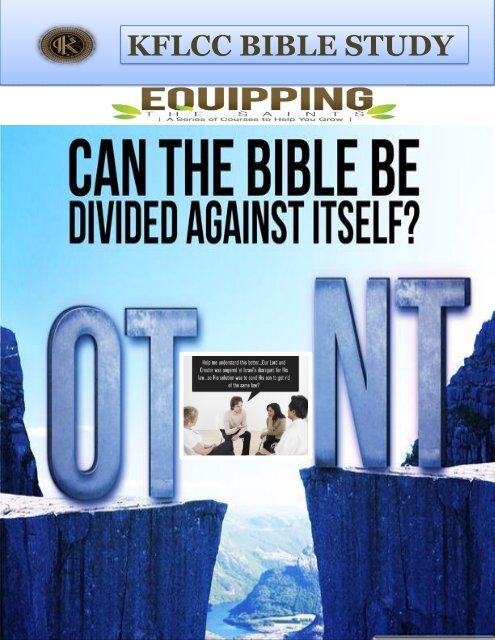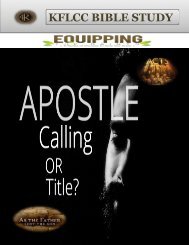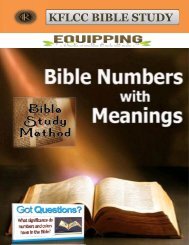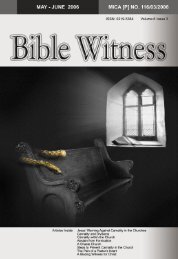Create successful ePaper yourself
Turn your PDF publications into a flip-book with our unique Google optimized e-Paper software.
KFLCC BIBLE STUDY
KINGDOM TRAINING:<br />
WEDNESDAY NIGHTS<br />
THE VALIDITY OF BIBLICAL LAW<br />
Week 1<br />
THE LAW (VS) GRACE<br />
Week 2<br />
MAN’S LAW (VS) BIBLICAL LAW<br />
Week 3<br />
NATURE OF GOD’S LAWS<br />
Week 4<br />
LAWS ON RIGHTEOUS JUDGMENT<br />
Week 5<br />
CONCLUSION OF THE MATTER<br />
Week 6<br />
*Please Save all Question For End Of Study Where Time Has Been Allocated*
“DISOVERING THE KINGDOM OF GOD WITHIN YOU” LUKE 17:21<br />
THE LAW<br />
MAGAZINE<br />
MATTHEW 5:17<br />
WEEK I<br />
Scripture: Matt 28:18-20, Matt 5:17, Gal 2:9, Rom 7:4, 8:2-7, Gen 1:28, 3:5, 1<br />
Cor 15:45,<br />
THE VALIDITY OF BIBLICAL LAW: A central characteristic of the churches and<br />
of modern preaching and Biblical teaching is antinomianism, an anti-law position. <strong>The</strong><br />
antinomian believes that faith frees the Christian from the law, so that he is not outside the<br />
law but is rather dead to the law. <strong>The</strong>re is no warrant whatsoever in Scripture for<br />
antinomianism. <strong>The</strong> expression, "dead to the law," is indeed in Scripture (Gal. 2:9; Rom.<br />
7:4), but it has reference to the believer in relationship to the atoning work of Christ as the<br />
believer's representative and substitute; the believer is dead to the law as an indictment, a<br />
legal sentence of death against him, Christ having died for him, but the believer is alive to the<br />
law as the righteousness of God.<br />
<strong>The</strong> purpose of Christ's atoning work was to restore man to a position of covenant-keeping<br />
instead of covenant breaking, to enable man to keep the law by freeing man "from the law of<br />
sin and death" (Rom. 8:2), "that the righteousness of the law might be fulfilled in us" (Rom.<br />
8:4). Man is restored to a position of law keeping. <strong>The</strong> law thus has a position of centrality in<br />
man's indictment (as a sentence of death against man the sinner), in man's redemption (in<br />
that Christ died, who although the perfect law-keeper as the new Adam, died as man's<br />
substitute), and in man's sanctification (in that man grows in grace as he grows in God lawkeeping,<br />
for the law is the way of sanctification).<br />
For example: by<br />
God <strong>Law</strong> man<br />
needed a sacrifice<br />
to attorn for his<br />
sins……… so<br />
Christ became<br />
that Atonement,<br />
thus fulfilling the<br />
<strong>Law</strong> of God. In so<br />
we no longer haft<br />
to make animal<br />
sacrifices for sin,<br />
thus by him<br />
obeying the <strong>Law</strong><br />
he brought forth<br />
Redemption &<br />
Salvation.
“DISOVERING THE KINGDOM OF GOD WITHIN YOU” LUKE 17:21<br />
MAGAZINE<br />
established the laws of godly society, development for<br />
man under God, and of the true prophets repeatedly<br />
recalled Israel to this purpose.<br />
<strong>The</strong> purpose of Christ's coming was in terms of this<br />
same creation mandate. Christ as the new Adam (I<br />
Cor. 15:45) kept the law perfectly. As the sin-bearer of<br />
the elect, Christ died to make atonement for their<br />
sins, to restore them to their position of righteousness<br />
under God. <strong>The</strong> redeemed are recalled to the original<br />
purpose of man, to exercise dominion under God, to<br />
be covenant-keepers, and to fulfil "the righteousness<br />
of the law" (Rom. 8:4).<br />
<strong>The</strong> law remains central to God's purpose. Man has<br />
been re-established into God's original purpose and<br />
calling. Man's justification is by the grace of God in<br />
Jesus Christ; man's sanctification is by means of the<br />
law of God.<br />
Man, as a covenant-breaker is in "enmity against<br />
God" (Rom. 8:7) and is subject to "the law of sin<br />
and death" (Rom.8:2), whereas the believer is<br />
under "the law of the Spirit of life in Christ"<br />
(Rom. 8:2). <strong>The</strong> law is one law, the law of God.<br />
To the man on death row in a prison, the law is<br />
death; to the godly man, the same law which<br />
places another on death row is life, in that it<br />
protects him and his property from criminals.<br />
Without law, society would collapse into anarchy<br />
and fall into the hands of hoodlums. <strong>The</strong> faithful<br />
and full execution of the law is death to the<br />
murderer but life to the godly. Similarly, the law<br />
in its judgment upon God's enemies is death; the<br />
law in its sustaining care and blessings is for the<br />
law-abiding a principle of life. God, in creating<br />
man, ordered him to subdue the earth and to<br />
exercise dominion over the earth (Gen. 1: 28).<br />
Man, in attempting to establish separate<br />
dominion and autonomous jurisdiction over the<br />
earth (Gen. 3:5), fell into sin and death. God, in<br />
order to re-establish the Kingdom of God, called<br />
Abraham, and then Israel, to be His people, to<br />
subdue the earth, and to exercise dominion<br />
under God. <strong>The</strong> law, as given through Moses,<br />
As the new chosen people of God, the Christians are<br />
commanded to do that which Adam in Eden, and<br />
Israel in Canaan, failed to do. One and the same<br />
covenant, under differing administrations, still<br />
prevails. Man is summoned to create the society God<br />
requires. <strong>The</strong> determination of man and of history is<br />
from God, but the reference of God's law is to this<br />
world.<br />
"To be spiritually minded is life and peace" (Rom.<br />
8:6), and to be spiritually minded does not mean to<br />
be other-worldly but to apply the mandates of the<br />
written word under the guidance of the Spirit to this<br />
world.<br />
<strong>Law</strong>less Christianity is a contradiction in terms: it is<br />
anti-Christian. <strong>The</strong> purpose of grace is not to set<br />
aside the law but to fulfil the law and to enable man<br />
to keep the law. If the law was so serious in the sight<br />
of God that it would require the death of Jesus<br />
Christ, the only-begotten Son of God, to make<br />
atonement for man's sin, it seems strange for God<br />
then to proceed to abandon the law! <strong>The</strong> goal of the<br />
law is not lawlessness, nor the purpose of grace a<br />
lawless contempt of the giver of grace<br />
<strong>The</strong> increasing breakdown of law and order must<br />
first of all be attributed to the churches and their<br />
persistent antinomianism. If the churches are lax<br />
with respect to the law, will not the people follow<br />
suit?
And civil law cannot be separated from Biblical law,<br />
for the Biblical doctrine of law includes all law, civil,<br />
ecclesiastical, societal, familial, and all other forms<br />
of law. <strong>The</strong> social order which despises God's law<br />
places itself on death row: it is marked for judgment.<br />
<strong>The</strong> <strong>Law</strong> Defined<br />
1. <strong>The</strong> <strong>Law</strong> is summarized in the 10 Commandments<br />
(Exodus 20:1-17).<br />
2. <strong>The</strong>re are 613 commands in the Torah. <strong>The</strong>y can<br />
be reduced to 10 and even to three virtues.<br />
Micah 6:8: "He hath shewed thee, 0 man, what is good;<br />
and what doth the LORD requires of thee, but to do<br />
justly, and to love mercy, and to walk humbly with thy<br />
God?"<br />
During a day when men were cutting off fingers and<br />
testicles to gods, Micah's revelation was dynamic. No<br />
god ever required so little from man as YHWH!<br />
3. <strong>The</strong> <strong>Law</strong> is summarized by three main virtues in<br />
the NT (Matthew 23:23):<br />
"Woe unto you, scribes and Pharisees, hypocrites! for ye<br />
pay tithe of mint and anise and cummin, and have<br />
omitted the weightier matters of the law, judgment,<br />
mercy, and faith: these ought ye to have done, and not to<br />
leave the other undone." [Matthew 23:23, Bible]<br />
<strong>The</strong> three main virtues that are the product of the<br />
law therefore are:<br />
• Faithfulness to God<br />
• Justice toward men<br />
• Mercy toward man<br />
4. <strong>The</strong> <strong>Law</strong> is summarized in two virtues as revealed<br />
by Jesus (Mt. 22:34-40):<br />
Master, which is the great commandment in the law?<br />
Jesus said unto him, Thou shalt love the Lord thy God<br />
with all thy heart, and with all thy soul, and with all thy<br />
mind. This is the first and great commandment. And the<br />
second is like unto it, Thou shalt love thy neighbour as<br />
thyself [Matthew 22:34-36, Bible]<br />
<strong>The</strong>ology and <strong>Law</strong><br />
• Nomism considers the Holy Spirit insufficient and<br />
advances the need for a strict adherence to law. This<br />
approach includes Judaism, Arminianism,<br />
Pelagianism, and Rationalism.<br />
• Antinomianism considers the <strong>Law</strong> unnecessary for<br />
man's conduct and relies mystically on the Spirit.<br />
This approach includes Mystics and some<br />
Dispensationalists. (deeds of the Nicolaitans)<br />
• Reformationism conclude the <strong>Law</strong> and the Spirit<br />
work together to convert the ungodly and to sanctify<br />
the believer.<br />
Three uses of the <strong>Law</strong><br />
1. Usus politicus or civilis: <strong>The</strong> <strong>Law</strong> serves a purpose<br />
of restraining sin and promoting righteousness.<br />
2. Usus pedagogicus: <strong>The</strong> <strong>Law</strong> serves to bring sinful<br />
man under conviction of sin making him conscious<br />
of his inability to meet the demands of the law.<br />
3. Usus didacticus (3rd use of the <strong>Law</strong>: tertius usus<br />
legis): <strong>The</strong> <strong>Law</strong> is the believer's a rule of conduct<br />
in order to make men holy.<br />
Three Types of <strong>Law</strong>s in the Torah<br />
• Moral <strong>Law</strong>s: <strong>Law</strong>s that directly reflect the<br />
character of God (Most of the 10 Commandments).<br />
• Civil <strong>Law</strong>s: <strong>Law</strong>s that governed polity in Israel<br />
(<strong>Law</strong>s on capital punishment)<br />
• Cultic <strong>Law</strong>s: <strong>Law</strong>s that were designed to make<br />
Israel distinct from her neighbors till Christ was<br />
born (Dietary laws).<br />
<strong>The</strong> <strong>Law</strong> And <strong>The</strong> New Testament Believer<br />
1. God's character as expressed objectively in the<br />
<strong>Law</strong> gives us the basis for saying there are absolutes.<br />
If there was no God, then there would be no ultimate<br />
right or wrong (Ps. 119:142).<br />
2. <strong>The</strong> objective law defines and exposes sin in a<br />
fallen world. Without the <strong>Law</strong> sin is undefined, and<br />
depravity becomes "normal" behavior. <strong>The</strong> <strong>Law</strong> also<br />
exposes the sin in man and the truth of man's<br />
bondage in sin and his ultimate responsibility to<br />
God (Gal. 3:19, 22; Rom. 7:9-14; 2:5,6).<br />
Mat 6:10 Thy Kingdom come. Thy will be done in earth, as it is in heaven.
“DISOVERING THE KINGDOM OF GOD WITHIN YOU” LUKE 17:21<br />
MAGAZINE<br />
4. <strong>The</strong> <strong>Law</strong> has no life-giving<br />
properties. It defines what is right,<br />
but doesn't empower mankind to<br />
keep it (Romans 7).<br />
5. <strong>The</strong> Christian is not under "the <strong>Law</strong>" as a means to attaining life (Rom. 6:13). However, believers<br />
can look to the law as an expression of the character of God to see what God wants to accomplish in<br />
him. (Galatians 3:21; 22; 5:13-14, 22,23).<br />
6. Christ is the Living Torah. He is the ultimate model of right and wrong. <strong>The</strong> believer is to model<br />
Christ, and in modeling Christ, he will ultimately fulfill the law (Romans 8:2-4).<br />
7. <strong>The</strong> believer is not free from the responsibility to keep the Ten Commandments because they<br />
reflect the character of God. <strong>The</strong> believer is responsible to reflect the character of God however it is<br />
expressed.<br />
<strong>Law</strong> in the Book of Galatians<br />
This section summarizes the approach to law outlined by the Apostle Paul in the Book of Galatians.<br />
It does so by listing the verses and then summarizing their purpose below:<br />
Gal. 1:9 A curse is pronounced on those who pervert the gospel.<br />
Gal. 2:15 Justification is by faith (sola fide), not by law keeping.<br />
Gal. 3:3 Sanctification is by faith and Spirit.<br />
Continue:<br />
3. <strong>The</strong> righteousness of God<br />
(expressed in the law) is what God<br />
demands and will accomplish in His<br />
work in history (Psalm 96:1, 11-13,<br />
97:1, 2; Is 9:6,7).
“DISOVERING THE KINGDOM OF GOD WITHIN YOU” LUKE 17:21<br />
MAGAZINE<br />
FACTS ON LAW:<br />
GAL. 3:5 LAW KEEPING IS NOT THE REASON FOR MIRACLES.<br />
GAL. 3:6 THOSE UNDER LAW ARE UNDER A CURSE.<br />
GAL. 3:7 LAW KEEPING WILL NEVER LEAD TO JUSTIFICATION.<br />
GAL. 3:8 THE LAW DOES NOT SPRING FROM FAITH.<br />
GAL. 3:13 CHRISTIANS ARE REDEEMED FROM THE CURSE OF THE LAW.<br />
GAL. 3:17 THE OLD COVENANT DOES NOT SET ASIDE THE ABRAHAMIC PROMISE THAT CHRIST<br />
WOULD BRING BLESSING TO ALL.<br />
GAL. 3:18 LAW AND GRACE ARE MUTUALLY EXCLUSIVE.<br />
THE PURPOSE OF LAW (GAL. 3:19)?<br />
FIVE PURPOSES OF LAW AS A PAIDAGOGON (S) (PAIDAGWGO,N)<br />
1. TO SHOW WHAT BEHAVIORS ARE SINFUL (GAL. 3:19).<br />
2. TO SHOW THE MISERY OF JUDGMENT FOR SIN (GAL. 3:10).<br />
3. TO SHOW THE VANITY OF SELF-RIGHTEOUSNESS (GAL. 3:21).<br />
4. TO SHOW ALL MEN ARE SINNERS (GAL. 3:22).<br />
5. TO SHOW US CHRIST, THE LIVING TORAH & REDEEMER (GAL. 3:24)
“DISOVERING THE KINGDOM OF GOD WITHIN YOU” LUKE 17:21<br />
MAGAZINE<br />
“REFERENCES”<br />
King James Bible<br />
Prepared by:<br />
Apostle Gary Carter, Jr.<br />
<strong>Not</strong>es:<br />
____________________<br />
____________________<br />
____________________<br />
____________________<br />
____________________<br />
____________________<br />
____________________<br />
____________________<br />
____________________<br />
____________________<br />
____________________<br />
____________________<br />
____________________<br />
____________________<br />
____________________<br />
____________________


















